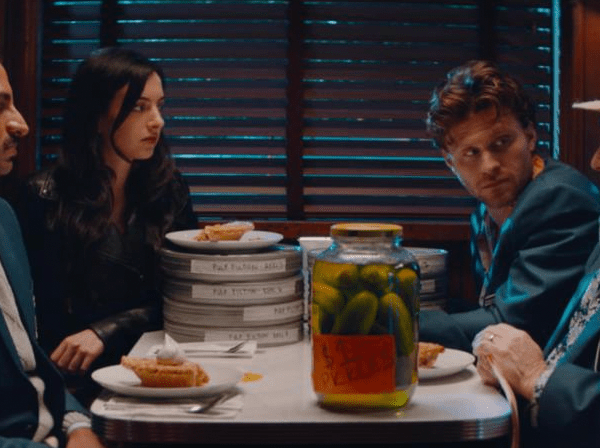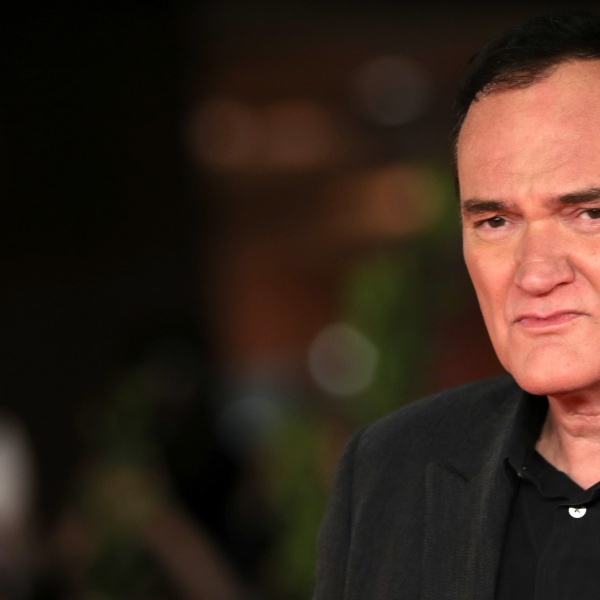When the initial idea that would become co-directors Molly Gordon and Nick Lieberman’s feature directorial debut was first hatched, it was relatively small-scale. Literally: It was a short film. But after Gordon and Lieberman, alongside their creative partners Ben Platt and Noah Galvin, released the short “Theater Camp” online in 2020 to quick acclaim, the group knew they needed to make it bigger. Like, feature-sized bigger.
Three years later, the foursome (small pause here to untangle all the credits of this tight-knit group: Gordon and Lieberman also wrote the film with Platt and Galvin, while Gordon, Platt, and Galvin starred in the film, and all four produced it; of Lieberman’s disinterest in acting, Platt recently told IndieWire: “Thank God there’s one of us that doesn’t want to perform. He’s basically the one that stays behind the camera”) premiered the feature version of “Theater Camp” at the 2023 Sundance Film Festival, where it was met with strong reviews and a quick buy from Searchlight Pictures, which picked it up in “the high seven figures range,” with a theatrical release guaranteed.
Both the short and the feature hinge on a concept near and dear to all of their hearts. Cleverly conceived as a mockumentary, “Theater Camp” picks up as our unnamed (and unseen) filmmakers are just a day into production. Their plan: Follow a summer at “AdirondACTS,” an upstate New York theater camp run by the beloved Joan (Amy Sedaris). When an ambitious strobe effect sends Joan into a coma, AdirondACTS is thrust into the hands of a motley crew, including Gordon, Platt, Galvin, Jimmy Tatro, Nathan Lee Graham, Ayo Edebiri, and Owen Thiele, for what threatens to be its last summer. High jinks (and high notes) ensue.
But while some filmmakers might struggle to turn a short into a feature, Gordon and Lieberman had no such trouble. The film shot in upstate New York over the course of about three weeks, a process Gordon deemed “absolutely fucking insane” but one that was more than fruitful. Maybe too fruitful.
“We have so much material for seven other films that should never come out,” Gordon said in a recent interview with IndieWire. “Nick and I, we had an archive of footage, just like a documentary, and we sat in a room every single day till one in the morning and weekends until the Sundance deadline, just trying to make it the tightest thing we could. That is what sucks about improv a little bit, is that some of the funniest stuff actually can’t be in the film because it doesn’t make sense for the plot, but it’s the funniest stuff ever.”
The pair’s tight collaboration — honed over years and years of friendship and creative work — came into play. “It’s falling in love with that idea that, OK, some of your favorite stuff’s not going to be in the movie, some of the stuff that you’ve fought to have in there and have work ultimately just does not have a place in the film that you’re making,” Lieberman said. “I think that’s where, being two of us and having it be so collaborative, it helps. Some of the things that we cut out, I’d be like, ‘Oh, man, but it’s so funny. Can we lose this?’ and if we both were like, ‘Yeah, let’s just get rid of it,’ it was like, ‘OK, OK.’”

With that Sundance submission deadline looming over their heads, Gordon and Lieberman set about snipping down their darlings (Lieberman is also the credited editor on the film) and shaping the best comedy possible. “We got this movie down to its size. We were just playing, playing, playing for a while, and the movie was over three hours, and then we got it down to basically an hour and a half in a week, a week and a half,” Lieberman said.
Gordon added, “That David Fincher quote, ‘Movies aren’t finished, they’re abandoned or they’re taken away from you,’ was never more true. Nick and I could have worked on this for the rest of our lives. We just didn’t have time to go down the spirals. You also just get over it faster if it didn’t work. It makes you have thicker skin, so you just want to keep generating new ideas, rather than we’re all sensitive artists, like ‘Nooo, you don’t like this joke?’”
OK, yes, some spirals, though. “The only spiral that we’d ever get into is, one of us would have an opinion, the other person would disagree, and then we’d convince each other for a while, and then be completely swapped and have the same level of passion arguing for the other thing,” Lieberman said. “We’re always going in the same direction. … And whoever’s right, it will be right, and that’s how we always went: best idea wins. We would watch the same cut and both be taking our own notes and we’d have the same 150 notes. Not just a couple of the same, literally 150 were exactly the same.”
(Even in a Zoom interview setting, Gordon and Lieberman are naturally aligned, quickly affirming each other answers with a “yeah, yeah” or “totally,” nodding along to each other’s answers, finishing each other’s sentences.)

One reason they had so much good stuff: They improvised much of the film with their talented cast, which also includes a deep pool of young and first-time stars alongside the veterans. “We did write out some jokes, but I would say 90 percent of the movie is improvised,” Gordon said. “We really took inspiration from a ‘Curb Your Enthusiasm’ outline and how it sets very clear boundaries for exactly what’s going to happen, but then all the stuff in between is play. I’ve been lucky enough to work on a lot of comedies as an actor, and you always have 20 minutes at the end to play around [when shooting a scene] and then they end up always using that. I’ve just always had this dream of, why can’t the 20 minutes be the full film?”
She added with a laugh, “Then obviously we wrote a whole musical, so we always knew we had that as an ending to really land in.” (The film ends, of course, with the entire camp putting on a big show, a delightful cherry on top of an already exceedingly fun feature.)
Fun seems to be the watchword of the entire project. “Some of the actors that were coming [to set] were coming from intense jobs where you have to be word-perfect,” Gordon said. “I was just talking to Ayo, and we were remembering that she came from doing ‘The Bear,’ and she was doing a very intense kitchen scene and then she came to us and just played a complete fucking liar, crazy person. She was like, ‘It was just so fun to get to be free a little bit and then I could go back to this other world.’ It really felt like this should be part of our daily routine as artists, getting to go have fun like this.”
Lieberman added, “There’s something so cool too about creating an environment, or creating a situation, where any mistake that happens is an opportunity for the scene to go there, or to be commented upon, and not the sense of like, ‘Oh, we blew it. OK, now let’s go back.’” Gordon chimed in, “Yeah, we rarely cut. We always used the mistake as an opportunity to move the story in a different way.”

The mockumentary style also helped them keep things loose. “I think Nick and I have always had an obsession with vérité documentaries,” Gordon said. “That was a side thing, not even connected to our love of comedy, but I think we’ve just always had this dream of blending those two things. … You can really get close with your subjects, and theater people are so fucking insane. We wanted to play it as real as possible, like they’re actually like this, and a mockumentary really allows you to do that.”
Gordon and Lieberman realize that the premise of the film might not be immediately appealing to everyone, but they think they’ve made something surprisingly universal. “I think our favorite reaction is when people are like, ‘Oh, I thought I would hate this, but I actually really loved it,’ because they think it’s a theater movie, but it’s so much more than that,” Gordon said.
She referred to some of the film’s other big inspirations, like “The Parent Trap,” “Wet Hot American Summer,” and “Jesus Camp,” though she added, “We really were more taking inspiration from the reality of life rather than specific films.” (For life-long theater kids like Gordon, Lieberman, Platt, and Galvin, there was plenty of fertile ground to cover.)
That summer (not just theater) camp vibe also informed how the film looks, which has helped pull in audiences who might not be so naturally inclined to watch a bunch of theater kids geek out.
“We really wanted to make our visual vibe of this movie surprising. We wanted people to be like, ‘Oh, I didn’t think this movie would look this way,’ but summer camp is the most beautiful time in your life, where you feel like anything is possible,” Gordon said. “It feels like you’re in a movie. You’re like, ‘Will I kiss this guy tonight? Oh, no, he’s gay.’ It’s like the ride of life, and we wanted it visually to feel like this nostalgic time capsule of childhood.”

Once the film was in its finished form (or, of course, as close to finished as it could ever be), the pair had to do something even crazier than make it: watch the damn thing with a massive audience at Park City’s Eccles Theater.
“We hadn’t really shown it publicly, we had done one friends and family screening,” Lieberman said. “When the film ended and we walked backstage, Molly was like, ‘I got you, you’re good,’ and I realized that I must have been shaking so intensely. In my own mind, I felt like I was maybe having a normal reaction, and I could see in Molly’s eyes that I was not, in fact, having a normal reaction. We’d spent so many sleepless nights worrying about each little microscopic moment [only to then] blast it in front of everyone for the first time. We’ve never had something either of us have worked as hard on in our lives as we worked on this movie.”
Even after the pair saw the final cut that’s going to theaters this week, Lieberman cracked, they’re still pitching new ideas to each other. Yes, they’ve tried to stop, really. “We’re still seeing it, being like, ‘Should we have cut there? We do have this other joke,’” Gordon said with a laugh.
Searchlight Pictures will release “Theater Camp” in theaters on Friday, July 14.





